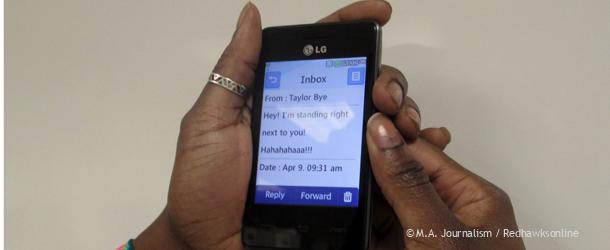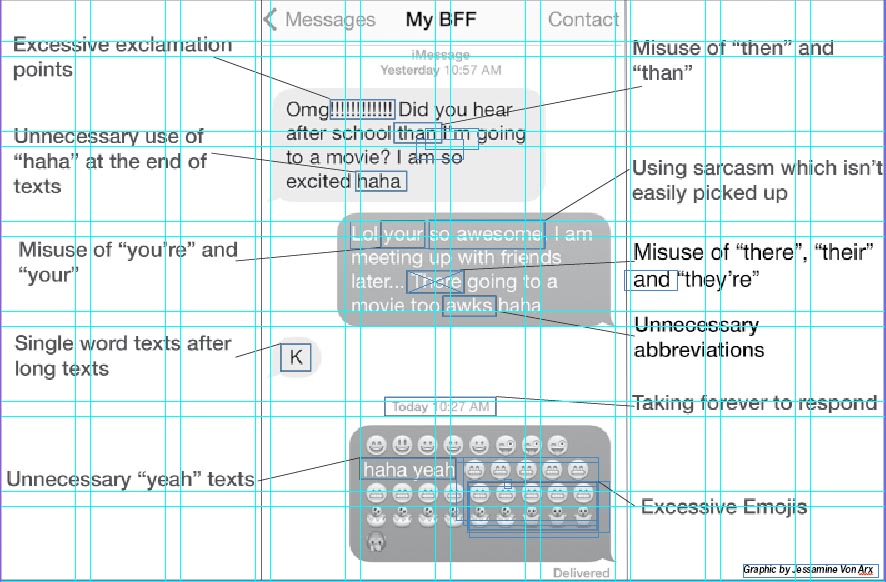Though texting is a quick mode of communication, it is often used in place of face-to-face interactions, affecting the quality of our conversations and how we form relationships
People are looking down, eyes glued to a mobile screen, fingers madly tip tapping away, quickly typing in word after word. Hardly any of them are looking up or noticing what’s going on around them.
Texting seems to be the most preferred mode of communication among young adults in America.
According to a Pew Institute survey conducted in 2012, about 75 percent of Americans between the ages of 12 to 17 own a mobile and 63 percent of them say they text every day, while the average number of phone calls stands at only 39 percent and face-to-face interaction outside of school at 35 percent.
With this in mind, the modes in which people talk to each other and how they talk to each other have been impacted- both positively and negatively- in various ways by the insurgence of text messaging as a part of daily life.
In general, texting is seen as a good mode of casual conversation or brief interactions.
Easy, quick conversation
“I love it for quick transfer of information: ‘I’m here.’ ‘Great,'” said English teacher Katherine Myers. “The communication where you don’t need a response.”
Or even if you need a response, but don’t have time to have a full blown phone conversation.
“Talking on the phone can be kind of a big commitment,” said junior Elizabeth Chun. “Like you could just text someone and ask the homework and they could answer, ‘oh, Page 22…’ Where on the phone it’s more likely to be like, ‘hey, how are you? Do you know what the homework is?’ And it can turn into this hour-long conversation and you’re not going to do your homework.”
It can also be looked upon as generally being courteous, if the texter is in a place where he or she can’t talk on the phone but needs to get a hold of someone.
“It’s a great way to be discreet about communication if you are waiting somewhere in a crowded place where you don’t want to have a conversation,” said English teacher Robyn Westrem. “In a doctor’s office, bus or if it’s loud, and there’s ambient noise.”
Or even for the person who is receiving the text, it can be a considerate form of communication.
“I’m more in touch with my colleagues outside of school because I can text them [outside of school],” said Myers. “Like with Ms. Beck, who has three children. I know I could text her without interrupting her family time.”
That’s the good of texting, but there’s a downside too. Sometimes texting can promote interruption and the opposite of good manners.
Substituting meaningful interactions
“I think it breaks down boundaries of protocol and politeness that we might’ve had,” said speech and debate teacher Nathan Johnson. “[It’s] where [you’re] just assuming [you] can interrupt whatever [the recipient] is doing with [your] text. So that concerns me a little bit how it might encourage us to not respect the time of the person we are sending the message to.”
Texting can also be borderline awkward, with its many possibilities of misunderstandings.
“What I don’t like is all the misunderstandings that can come from [texting] and people can’t always tell the emotion behind it,” said junior Rachel Zellie. “For example, you can be texting someone and say something jokingly but then they take it seriously and get mad at you.”
It is also generally agreed upon that texting should not be a substitute for face-to-face communication, but that doesn’t always happen.
“Something that I have witnessed that I find both humorous and sad at the same time, sometimes when I announce basketball games, I look across the gymnasium and there’s 15 to 25 students sitting in the gymnasium and probably half of them are on their cell phones,” English teacher Kristofor Sauer said. “And probably half of those are talking and texting someone else who’s in the stands, like two rows away from them and I look at that and think that the prevalence of text messaging is significantly decreasing our ability to fully interact with one another.”
Degrading the quality of conversations
If that’s the case, and texting is becoming a substitute for face-to-face, how is it affecting the quality of the actual conversation?
“A poor use of texting would be [texting the message]: ‘I broke up with my boyfriend,’ said Myers. “That should be a person-to-person phone call or face-to-face communication. So then what? What is the response? ‘I’m so sorry, what happened?’ And then things just grow and now you haven paragraphs that you need to be writing. Then to me, it devalues the human situation as it’s just through a text. There’s so much to communicate and it’s not the forum to do it.”
Johnson agrees that texting can minimize the depth of a good conversation.
“It reduces the depth of conversations, it reduces the effort with which we’re making our communications,” Johnson said. “I know that when I speak in person, I have to convey a certain tone of voice.” “When I’m talking to [a certain] person, I want to indicate to this person that I’m listening,” Johnson said, “with the “mmhm’s” and all the these things to let this person know I’m paying attention to them and I don’t have to do those through this medium [texting].”
Texting is a double edged sword. On the one hand, it promotes interruption and reduces the effort and depth of a conversation.
But on the other, it’s a convenient way to communicate important information.
“I think it’s a shifting medium,” said Westrem. “It’s just neutral. I would never say that we’re losing something in communication [because of texting]. Something’s emerging, but people still need to speak to each other.”
“I don’t know if they do that less,” Westrem said. “I’d say they should do it in addition to. It’s a neutral thing and it depends how people use it.”
One thing is for certain though, texting cannot and should not be used to substitute the real thing, which is being able to kindle a relationship with someone in person.
“When you think back about your life and you think about the best times of your life, you’re not going to remember the best times being in front of a screen,” Sauer said. “You’re going to remember the best times you had in front of people.”


